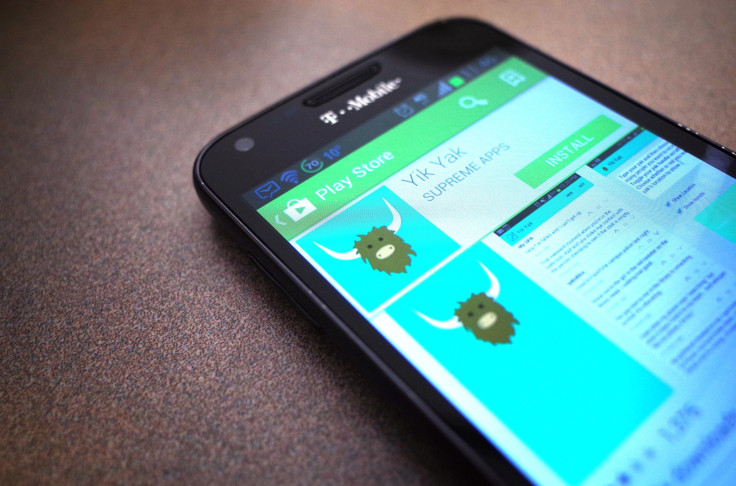Yik Yak Threats On College Campuses: Missouri Arrests Highlight Growing Problem

Two Missouri college students were arrested this week for violent threats targeting black students on the anonymous messaging app Yik Yak. The posts that sparked the arrests are the latest in a string of anonymous Yik Yak threats on college campuses.
Hunter M. Park, a student at Missouri University of Science and Technology, was arrested for making alleged “terroristic” threats on social media, the university’s website said. The second student, Connor B. Stottlemyre of Northwest Missouri State, was arrested Wednesday morning in his residence hall after allegedly making violent racist threats the previous night, local news reports said.
Stottlemyre's post allegedly read: “I'm going to shoot any black people tomorrow, so be ready.”
This isn’t the first time the app, which launched in 2013, has been used to spread fear across campuses. Several other schools have had to take action in response to Yik Yak threats promising gun violence.
Update on Missouri University: Anonymous posts death threat towards black students on Yik Yak!#ConcernedStudent1950 pic.twitter.com/cIZGhhfFib
— Ray Warren Symposium (@rwsymplc) November 11, 2015
Earlier this week, a student at Charleston Southern University was arrested and held on $300,000 bail after allegedly threatening on Yik Yak to shoot people in a residence hall.
One of the posts read, "I cannot wait to shoot you guys up tomorrow." The posts have since been removed from the site, local news outlets reported.
Earlier this month, a Fresno State freshman and football player was arrested for a Yik Yak post that threatened armed violence on campus. The California university said it was prepared to evacuate the campus, but then identified and arrested the student, reports said. He was released after posting $20,000 bail.
Typically bustling parts of the @Mizzou campus are very empty right now. #Mizzou pic.twitter.com/UjHDgGNy23
— Jill Ornitz (@Jill_Ornitz) November 11, 2015
Last month, a student at Penn State was arrested in a Yik Yak post in which he said he would bring assault rifles to school and "kill everyone," the Allentown, Pennsylvania, newspaper the Morning Call reported.
Just hours later, a student at Emory University’s Oxford Campus was arrested for a Yik Yak post threatening to shoot students on campus. The post read: “I'm shooting up the school. Tomorrow. Stay in your rooms. The ones on the quad are the ones who will go first,” local reports said.
A third Yik Yak incident occurred in October when a Texas A&M University student was arrested after allegedly posting in all caps: “This is not a joke! Don't go to campus between 7 and 730. This will be my only warning."
And in July, a student at Brigham Young University-Idaho turned himself in after Yik Yak posts prompted a universitywide investigation. The posts apparently read, "BYU-I is in trouble tomorrow. Don't go to school,” and in all caps: "This is not a joke. Your classmates or you will be hurt," local outlets reported.
The university’s student press reported the anonymous app was also a problem for the university in 2014.

There are several other instances where the app has caused some serious problems. For instance, a former Syracuse University student was arrested in a violent Yik Yak post. Another anonymous post prompted an Ohio high school to search its students bags. A high schooler in Missouri was arrested last year for a threat made using the platform. And the list goes on.
Brooks Buffington, Yik Yak's co-founder and chief operating officer, posted a message Wednesday in response to the Missouri instances.
“It’s our hope that the range of discussion on MU’s campus can help to bring about positive resolution and a better understanding within the community. But there’s a point where discussion can go too far -- and the threats that were posted on Yik Yak last night were both upsetting and completely unacceptable,” Buffington said.
He added: “Let’s not waste any words here: This sort of misbehavior is not what Yik Yak is to be used for. Period. It is not condoned by Yik Yak, and it violates our Terms of Service.”
Reached for comment about the growing problem of Yik Yak threats on campuses, a spokesperson for the company directed International Business Times to information about the company's legal policy in cooperating with investigations. The spokesperson had no further comment beyond Buffington's post.
Yik Yak said on its website it has disabled the app from working near middle schools or high schools to combat bullying. Whether or not the social media company will be forced to make further changes in the face of rising threats on college campuses remains to be seen.
© Copyright IBTimes 2024. All rights reserved.





















